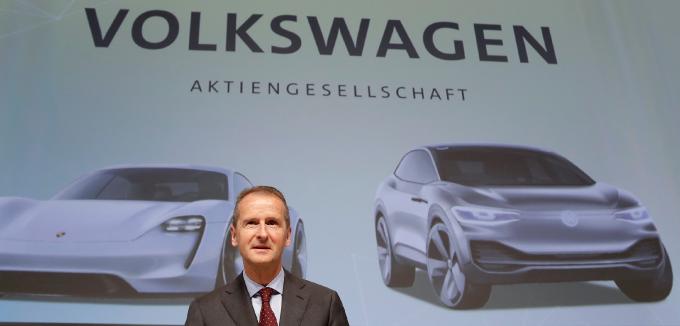
05/03/2018
New Group structure at Volkswagen Diess wants to rebuild the “Tanker” Volkswagen into a “speedboat network”
AP
VW CEO Herbert Diess at the Annual General Meeting in Berlin: VW should be “honest, open, decent”
Volkswagen should be “honest, open, truthful, in one word: more decent”: At the Volkswagen General Assembly in Berlin, the new CEO Herbert Diess again called for a cultural change in the world’s largest automaker. A lasting economic success is only possible with a healthy corporate culture, Diess said. The basis for this is the new Group structure, which divides the Group into a total of six brand groups. How this works – and what that means for the car industry.
The most important announcement from Diess: “Today we have too much complexity in the Group with too long decision-making paths, we are duplicated in many places, many decisions are too far away from the operating business – and thus our customers.” And there are too many friction losses through lengthy coordination between corporations and brands, and our new leadership model puts an end to it. “
What it’s all about: Diess will divide the Group into six operating units in the future. However, the region China receives a special status. In the brand group “volume” fall in the future, the brands VW, Skoda, Seat, the commercial vehicle division and the mobility service subsidiary Moia.
In the future, the group “Premium” will essentially comprise Audi, the brand unit “Super Premium” the sports car dealers Porsche, Bentley, Bugatti and, in the future, Ducati. “Truck & Bus” as fourth unit includes the heavy commercial vehicles of MAN and Scania. Procurement and component business should be the fifth entity, financial services the sixth. For the motorcycle brand Ducati, the heavy-duty engine divisions Renk and MAN Diesel and Turbo Diess wants to have “reliable future prospects” worked out – they could therefore be sold.
What this means for VW: Instead of twelve powerful brand managers – who in the past often worked against each other – there will be fewer decision-makers at the top level. In addition, each member of the Group Executive Board should also take over higher-level corporate tasks: Audi CEO Rupert Stadler will in future not only be the boss of the “Premium” brand group, but also responsible for group sales.
Porsche CEO Oliver Blume is also responsible for group production in addition to the “Super Premium” brand group. According to Diess, this should divide the tasks of corporate management into “more shoulders”, so that the Group should be able to act faster and closer to the markets.
However, Diess gets the most power. He is not only responsible for organizational development of the Group and its brand and product strategy – but also for vehicle IT. And first of all for the group research and development, which, however, is to be “taken over by Audi in the future”.
Why this is important to the industry as a whole: Diess’ reorganization push increases the pressure on some competitors to rethink their structures as well. Some have long ago gone in this direction: Toyota, for example, has used the crunching accelerator pedal crisis to strengthen ownership in the individual regions. Result: The Japanese are no longer as centralized as they were a few years ago, when all product decisions had to be approved at the headquarters in Japan.
Daimler is currently working on a tripartite division – but this will not be ready for competition until next year. The French automaker PSA or Renault, however, are still tightly organized by individual brands, even in the Korean Hyundai Group is similar. First, the 12-brand Volkswagen group must show that such a brand group division makes the auto giant in fact more powerful. But the pressure on the industry is increasing to be more flexible for the future.
Shareholders today are also expected to provide explanations from the Supervisory Board during the course of the Annual General Meeting Circumstances and reasons for the sudden replacement of Matthias Müller demand – and want to know from the VW boards, as the course of Diess from its predecessor. Read more about Diess’ way for the Volkswagen Group in the current issue of the manager magazine,
Tailwind through good numbers
Whether the Volkswagen Group such a profound change ever hinbekommt – as likely to hook on Thursday, several shareholders. Tail wind provides this but the last good performance of the group: In the first quarter of the year, Volkswagen Group sales climbed by 3.6 percent to 58.2 billion euros thanks to a record for deliveries, but the car giant at 3.3 billion euros earned a little less than a year ago at around 3, 4 billion euros.
The Volkswagen core brand, the problem child for a long time, increased operationally slightly, and corporate brands such as Audi and Skoda performed well. Overall, Volkswagen boosted the number of deliveries to customers by 7.4 percent to nearly 2.7 million vehicles. And the Group has also recently confirmed the outlook for the current year: According to this, sales should increase by up to five percent in 2018, and the operating return – that is, the share of operating income – should be between 6.5 and 7.5 percent – In the first quarter, it was 7.2 percent.
Related articles
more on the subject
© manager magazin 2018All rights reservedReproduction only with the permission of manager magazin Verlagsgesellschaft mbH
